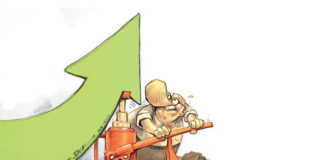An industry potentially providing about 70% of a country’s GDP and more than 80% of its employment, should receive careful focus. This of course is agriculture, and more specifically – farming. Across most of sub-Saharan Africa, farming (small-scale farming, in particular), is the primary livelihood of the majority of the population. When you combine this with painfully low GDP per capita, you’re facing a problem.
With economies growing at breakneck speeds, and urban centres straining to keep up with the influx of migrants looking for jobs, the small-scale farmer often gets left in the dust. Africa has the ideal makings of a robust farming community, but faces many challenges, even when blessed with fertile soil, ample land, water, and labour that is closely tied to the land. How can the African small-scale farmer become a modern farmer for the 21st century? Here are three areas in which small-scale farming can modernise.
Loans
The first step is financing. Hybrid seeds, fertilisers, water pumps, and simple improvements in farming techniques often cost money, which most small-scale farmers simply don’t have. However, modern commercial farmers in the rest of the world don’t farm with their own money. It’s nearly always borrowed from banks or local co-ops. Financial institutions across Africa need to realise there is money to be made servicing what are often considered the ‘bottom of the pyramid’ customers.
By first understanding agriculture and the challenges faced by small-scale farmers, local banking institutions can feel confident providing the small loans farmers need to buy inputs. At the same time, local insurance companies should gain a better understanding of agriculture as a potentially lucrative market.
In developed countries, farmers receive credit and also use crop insurance extensively to protect themselves against unforeseen catastrophes of weather, pests, or even the market price. These financial products are proven and well-developed in advanced agricultural industries; with simple business development approaches, local financial service providers could tap into a lucrative market and bring small-scale farmers into the modern world.
Effective low-tech
Technology has already had a profound impact on the lives of African society, with the widespread adoption of mobile phones. Illegal miners in Congolese jungles now have access to the latest spot prices from the London Metal Exchange. These same capabilities exist for small-scale farmers to access the latest prices.
App and mobile service developers need to market their products to this market, which is often simply unaware of the tools at its disposal. Some companies with large outgrower groups such as the tobacco, tea, and coffee industries, are using phone apps that allow farmers to indicate their projected yields, harvests and receive weather reports, pricing information and relevant news. These platforms could be rolled out to larger, non-affiliated numbers of small-scale farmers who already use their phones for a variety of applications.
Innovative tools
The ubiquitous hand-held-hoe, the small-scale farmer’s workhorse across most of Africa, will continue to be important for those farming on one or two hectares. Its simplicity, efficiency and costs are still too competitive to be replaced. But those are the same features of many innovative tools being developed in Brazil, India, and elsewhere in Africa.
Simple, compact tractors that can be economically used on small lands, better grain storage bins, and hand-cranked maize shucking equipment, are all examples of equipment that today’s smallholder farmers can use to join the modern world. In an era where commercial farmers are increasingly relying on satellites and drones to improve yields and cut costs, small incremental improvements are the key for Africa’s small-scale farmers.
The small-scale African farmer and his land are inextricably linked. There is a bond and the makings of a productive, modern farmer. Service providers must start to see these farmers as a lucrative market for their products. Meeting African small-scale farmers where they are and moving them into the 21st century has to be the future for African agriculture. We cannot solely rely on massive ‘land grab’ investments to produce the food, jobs, and tax base needed to grow domestically and keep pace with fast-rising global food demand.
Of course, the challenge is much bigger than this, and must include goverment commitment to improve infrastructure and education. However, simple steps can turn Africa’s small-scale farmers into modern farmers.
The views expressed in our weekly opinion piece do not necessarily reflect those of Farmer’s Weekly.













